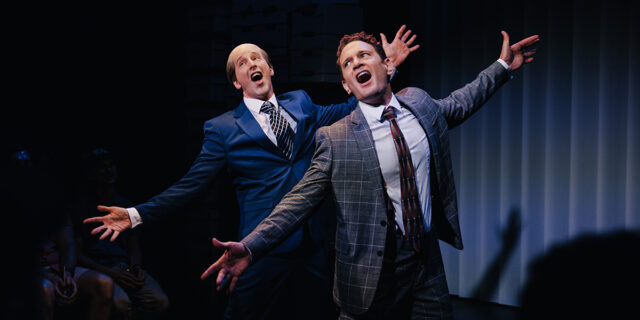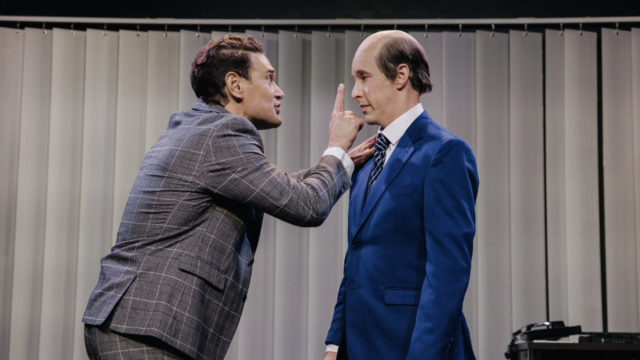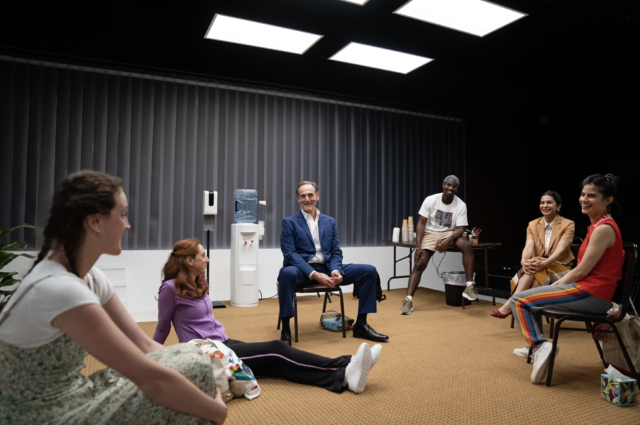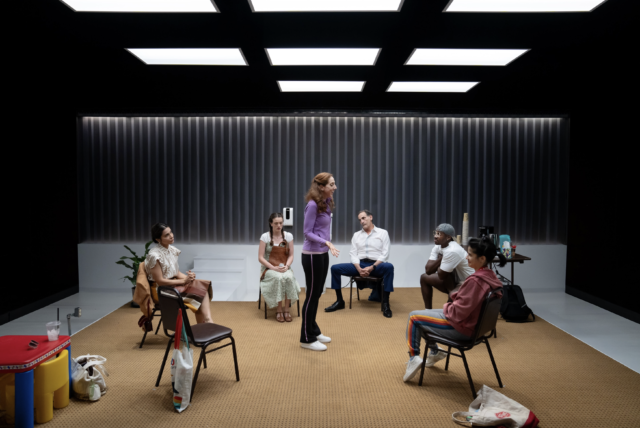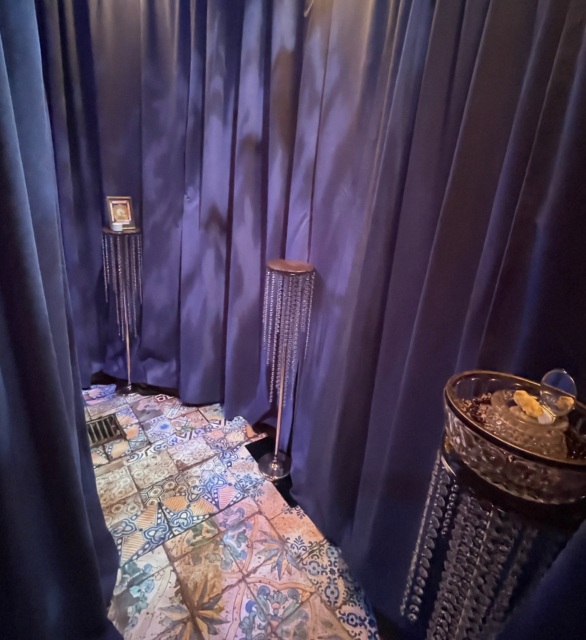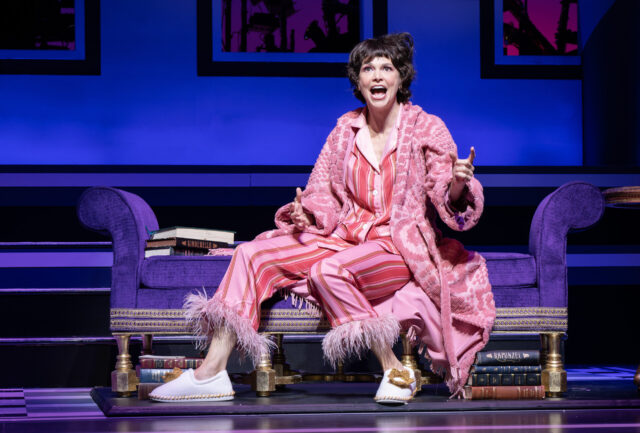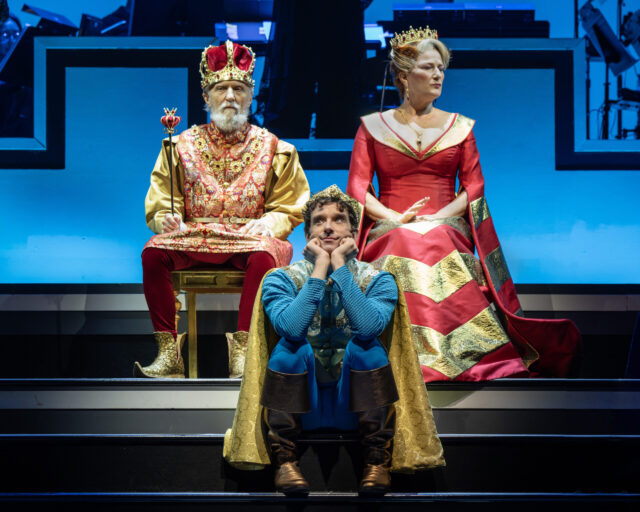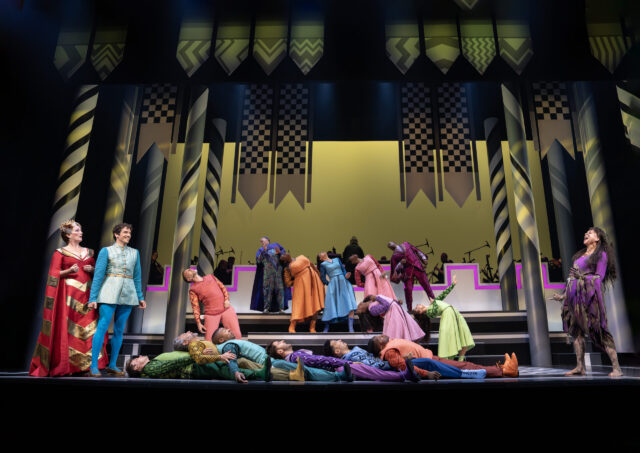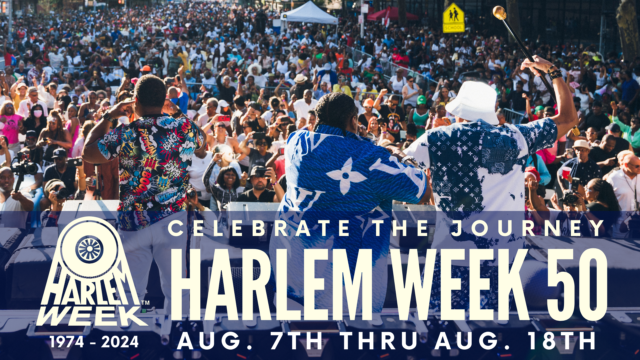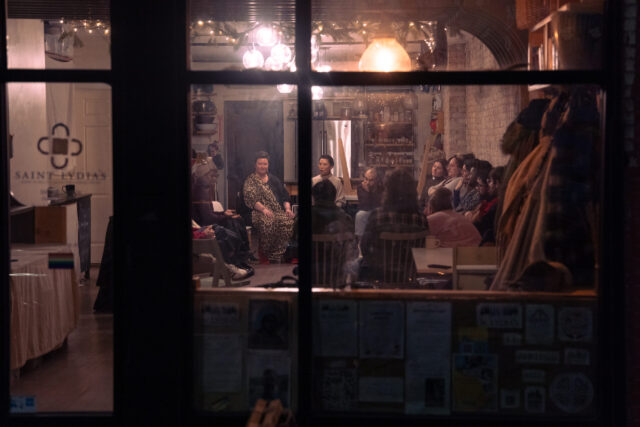
The Voices in Your Head is back for an encore run in a storefront Brooklyn church (photo by HanJie Chow)
THE VOICES IN YOUR HEAD
St. Lydia’s Dinner Church
304 Bond St., Brooklyn
September 9 – October 11, $39.72-$55.20
stlydias.org/events
www.eggandspoontheatre.org
In January, The Voices in Your Head offered a unique view of grief counseling, taking place at St. Lydia’s Dinner Church in Brooklyn. The sixty-minute play sold out quickly, extending its run and adding seats. It’s now back for a return engagement September 9 – October 11, and some nights are already fully booked. For other nights, there are either $39.72 or $55.20 Pay It Forward tickets available, but not both. Christian Caro, Marcia DeBonis, Tom Mezger, Daphne Overbeck, Erin Treadway, and Jehan O. Young reprise their roles in this Egg & Spoon remount, with Alex Gibson, Jamila Sabares–Klemm, and Molly Samson joining the cast.
Below is my original review of the January 2024 edition of this thoroughly involving and entertaining experience.
————————————
Lately I’ve been thinking more than ever about grief and death. I’m not a support group kinda guy, but when I heard about The Voices in Your Head, I knew I had to go.
I found solace — and nearly nonstop laughter — in Those Guilty Creatures’ immersive, site-specific group therapy black comedy, which continues at St. Lydia’s storefront dinner church in Brooklyn through January 29.
The space has been renamed St. Lidwina’s, after the Dutch patron saint of chronic pain and ice skating. The church has a large front window and door, looking more like a cozy shop than a place of worship. When you arrive, you are asked to check off your name on a sign-in sheet; to protect your anonymity, there are no last names, although people passing by outside can peek in and see you.
In the center of the room are more than two dozen unmatched chairs arranged in a large oval. In the back is a working kitchen where the facilitator, Gwen (Vanessa Kai), greets everyone while making tea and cookies. Several attendees engage in friendly conversation and chitchat. Shortly after Gwen calls the meeting to order, it becomes apparent that a handful of the participants are in the cast.
“It’s funny, when I was at my lowest, I was going to all these different meetings; it felt like dating, trying to find the right match, and they were all so . . . maudlin? I thought, there has to be another way. So, I started this group,” Gwen says. “Evidently, there was a need. So, we’re all here, we’ve met the criteria, but, broadly, I like to think of this as a place to share a sensibility. Laughter comes easier for me in here than out there. Everyone has their own relationship to grief; I’ve been considering mine, but what about anti-grief? We seek that through shared stories, activities, and discussions. . . . We aim to hear three stories each week, which, hopefully, helps us exchange some weird-ass joy.”
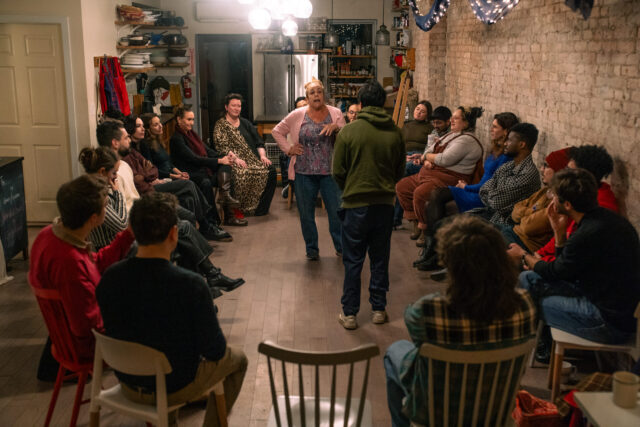
The audience becomes immersed in the grief of others in The Voices in Your Head (photo by HanJie Chow)
Sharing their sensibilities are the vivacious and outgoing Regina (Daphne Overbeck); Vivian (Marcia DeBonis), who believes in “Death, Embarrassment, Trauma”; Caleb (Christian Caro), who doesn’t want to be sad in college and can’t stop texting; the ultraserious Sandra (Erin Treadway); and the practical Hadiya (Jehan O. Young), who loves “the morbid stuff.”
They are eventually joined by first-timer Blake (Patrick Foley), who is determined to turn his story of loss into a Netflix special, and Ted (Tom Mezger), who actually attends the church and saw a flier.
Over the course of sixty fun, lively minutes, the group discusses Kelly Clarkson, hot cater waiters, self-care, vacuuming, exfoliating, sand, and other items and issues as they explore their personal misfortunes. A role-playing session that puts some of the group members in specific social situations doesn’t go quite as expected. During a break, the characters gossip, revealing more about who they are.
At the center of it all is the arbitrariness of death and Gwen’s assertion that we should “just approach the nature of the loss with a sense of humor. It helps us hold a certain space.”
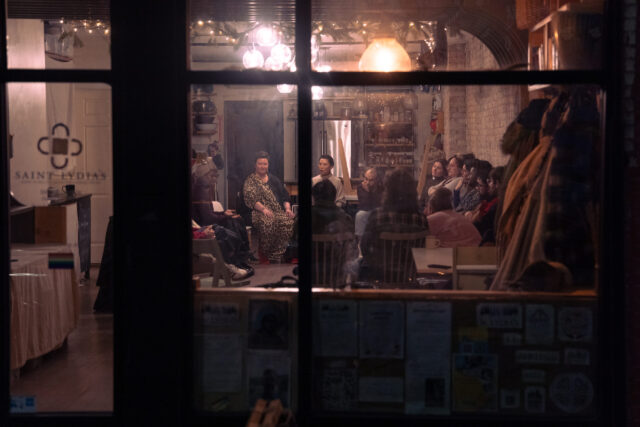
The Voices in Your Head takes place in the storefront of a Brooklyn dinner church (photo by HanJie Chow)
The cast is uniformly excellent, led by Kai (The Pain of My Belligerence, KPOP) as the not-necessarily-so-stable Gwen, the always terrific DeBonis (Mary Page Marlowe, Small Mouth Sounds) as the chatty but caring Vivian, Treadway (Spaceman, War Dreamer) as the dour Sandra, Young (Speech, The Johnsons) as the purposeful Hadiya, Overbeck (Typed Out: A Princess Cabaret, Nightgowns) as the wonderfully over-the-top Regina, and Caro making his off-Broadway debut as the inattentive Caleb, but Foley (Circle Jerk, The Seagull/Woodstock, NY) nearly steals the show with his unforgettable Christmas story.
Created by Grier Mathiot and Billy McEntee and gleefully directed by Ryan Dobrin, The Voices in Your Head is as smart as it is hilarious. It’s not so much about how we deal with death than how we deal with life. Everyone reacts differently to tragedy and loss, but, as Gwen points out, “We need to hear each other’s laughter.”
The Voices in Your Head is not interactive — the audience should leave the talking to the actors — but feel free to mingle afterward and share your own thoughts about this engaging and involving experience.
[Mark Rifkin is a Brooklyn-born, Manhattan-based writer and editor; you can follow him on Substack here.]
